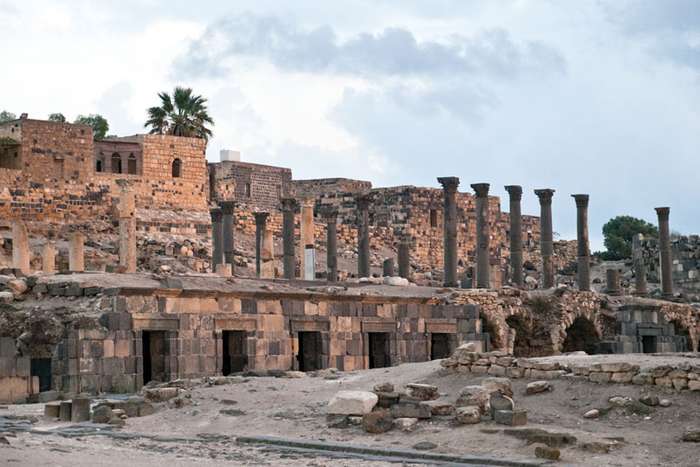And when he came to the other side, to the country of the Gadarenes, two demon-possessed men met him, coming out of the tombs, so fierce that no one could pass that way. And behold, they cried out, “What have you to do with us, O Son of God? Have you come here to torment us before the time?” Now a herd of many pigs was feeding at some distance from them. And the demons begged him, saying, “If you cast us out, send us away into the herd of pigs.” And he said to them, “Go.” So they came out and went into the pigs, and behold, the whole herd rushed down the steep bank into the sea and drowned in the waters. The herdsmen fled, and going into the city they told everything, especially what had happened to the demon-possessed men. And behold, all the city came out to meet Jesus, and when they saw him, they begged him to leave their region.
Matthew 8:28-34

When you see someone who has suffered find relief, what is your natural response? Generally, our first response is to celebrate with them. But what about when that relief comes at a great cost to yourself without your “consent”? How do you respond then? Do you give glory to God for healing or do you curse Him for the price that was required to bring that healing?
Jesus and his disciples have just crossed the Sea of Galilee after ministering to Peter’s household and his local community. In fact, the primary reason that Jesus crossed the Sea of Galilee was to seek refuge from the pressing crowds (Matthew 8:18). After calming the storm and the fears of His disciples, they disembark the boat in the country of the Gadarenes, south of the River Yarmuk. Gadara was the capital of the province of Peraea, and is known today as Umm Qais in the country of Jordan, near the border of Syria. In 218 BC, the Greek historian Polybius described Gadara as the “strongest of all places in the region.” It was one of 10 cities in the region designated by the Roman governors as the Decapolis.
What is perhaps best known about Gadara is that it was the birthplace of Meleager, one of the most admired Hellenistic Greek poets of antiquity. He was most known not only for his own work, but more so for his compilation of the works of other Greek poets in his collection that comprised the “Greek Anthology.” Additionally, Gadara was known as a major trading station for pork, which was highly prized in the Roman Empire as a welfare allowance for the poor. As a result, Gadara was quite rich due to the herding and hunting of wild pigs.
At the time that Jesus was there, Gadara is known to have had no fewer than 3 performance theatres, a colonnaded market street, and a Greek temple to the mythological god, Poseidon – as evidenced by the large baths discovered during excavations. The god Poseidon was also known as “lord of the earth” or the “earth-shaker” and was historically credited as the reason for the seismic activity in the region as regaled in Greek myths. As you may recall from yesterday’s study of Jesus calming the storm on the Sea of Galilee, this speaks directly to the religious insights of the Gadarenes as it pertains to earthquakes in the region.
Not only did Jesus demonstrate His power over nature in the calming of the storm, He also demonstrated His authority over the “god of the earth”. Furthermore, in comes two demon-possessed men – likely adherents to the worship of Poseidon from Gadara. According to Mark’s account (which he sets in Gerasa – a few miles south of Gadara – which likely more accurately places the events somewhere in between the two cities), there were multiple demons – as many as 1000 – as evidenced by the name “Legion”.
As Jesus cast the demons into the pigs and the entire herd rushed into the Sea of Galilee and drowned, the herdsmen ran away and reported to the leaders of the city. Word got around so much so quickly that the entire city came out to meet Jesus. However, contrast the response of wonder from Jesus’ disciples with the response of the people of Gadara as they begged Him to leave the region.
They didn’t just politely ask Jesus to leave. They begged Him. Jesus was viewed as a threat to their economic way of life. He was a threat to their religious way of life. The very act of casting out the demons from these two men demonstrated that Jesus was a threat to everything they held dear.
And I ask you, what happens when Jesus upsets your apple cart? How do you respond when He challenges your way of life? How do you react when He takes from you that which holds you back from serving Him? Do you beg Him to leave you alone so that you can go back to the chains of this world? Or do you invite Him to make Himself at home within the recesses of your heart and mind? Do you offer Him your everything for the sake of His kingdom knowing that He has the power to overcome everything that binds you?
I beg you, I implore you. Open you heart to hear from Him today. Cling to Him for dear life and rest at His feet knowing that He has your best interests at heart. Let His Kingdom come in you today.